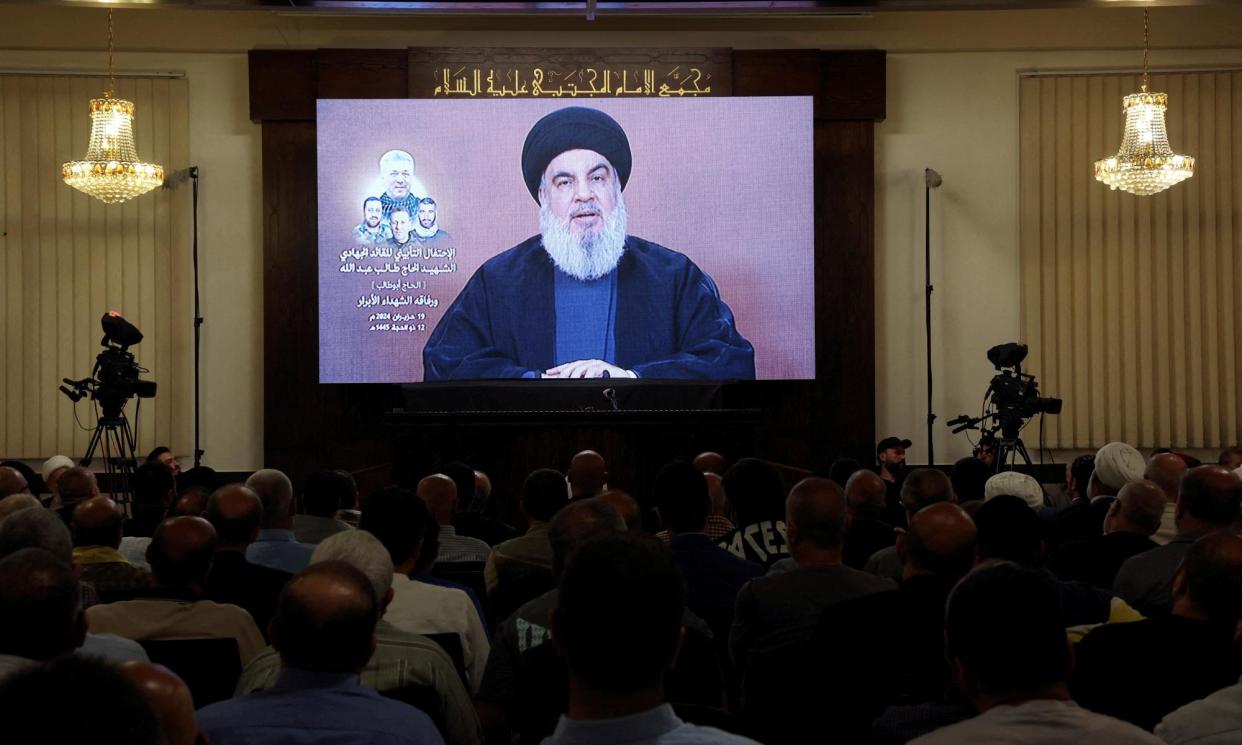Hezbollah leader: Cyprus will be target if it lets Israel use its territory in conflict

The leader of Hezbollah, Sayyed Hassan Nasrallah, warned of a war “without rules or ceilings” in the event of a full-scale Israeli offensive against the Lebanese militia, as he threatened that Cyprus could become a target if it allowed Israel to use its territory in any conflict.
Cyprus and Israel have a bilateral defence cooperation agreement which has seen the countries conduct joint exercises.
“Opening Cypriot airports and bases to the Israeli enemy to target Lebanon would mean that the Cypriot government is part of the war, and the resistance will deal with it as part of the war,” the Hezbollah chief said.
Nikos Christodoulides, the island’s president, responded on Wednesday evening: “Cyprus remains uninvolved in any military conflicts and positions itself as part of the solution rather the problem.”
He sought to emphasise the humanitarian role the EU’s easternmost state had played in the Middle East, facilitating the opening of a sea corridor to transport desperately needed aid to Gaza.
“Our humanitarian corridor is a testament to our commitment to peace and stability,” he told reporters at a University of Cyprus graduation ceremony.
He added: “Such statements are not pleasant, but they do not reflect reality. Cyprus is not participating in any military engagements.”
Christodoulides said the threat would be raised through diplomatic channels.
Nasrallah’s remarks came a day after Israeli generals said they had signed off on planning for a wider offensive against Hezbollah, and Israel’s foreign minister, Israel Katz, suggested the country was on the brink of deciding whether to expand the war.
Speaking at a memorial for Taleb Sami Abdallah, the most senior Hezbollah commander to be killed by Israel since the two sides began cross border exchanges on 8 October, Nasrallah insisted that Hezbollah’s role was to support Hamas fighting in Gaza and that it had succeeded in tying up Israeli forces in the country’s north.
Nasrallah spoke about a strategy of a limited conflict with Israel, short of all-out war and aimed at a ceasefire in Gaza, but the rhetoric appeared more heated as he said that nowhere in Israel would be safe from Hezbollah’s attacks.
Nasrallah’s televised speech underlined the difficulty of diplomatic efforts to de-escalate the conflict between the two sides as it has edged into ever more dangerous territory.
“We have more than 100,000 fighters, and even more, even in the worst-case scenario. We have prepared for the worst-case scenario and Israel knows it,” he said.
Describing Hezbollah’s intelligence-gathering, which was dramatised by the broadcast of drone surveillance footage of Haifa on Tuesday, Nasrallah said: “Since 8 October, the enemy has understood that certain places would be targeted,” adding that the militia had hours of surveillance footage of Haifa.
“It knows we have information about these locations,” he said.
“In 2006 [during the second Lebanese war], we had the ambition to bomb the Israeli base on Mount Meron. Today we just tell the fighters to do it, and they do it immediately.”
“Whatever our intentions,” he continued, “whether we want all-out war or not, the enemy is obliged to remain ready in the north of the country,” adding that Israeli threats had “no impact” on Hezbollah’s calculations.
On Wednesday, before Nasrallah’s speech, Israeli strikes in southern Lebanon killed three Hezbollah fighters, the militant group said, as a US envoy tasked with avoiding a devastating regional war returned to Israel after meeting officials in Lebanon.
One Israeli airstrike landed near the southern coastal Lebanese city of Tyre, 20 miles from the frontier, which is sheltering many Lebanese people displaced from the immediate border area.
On the Israeli side of the Blue Line, which divides Israel and Lebanon, Hezbollah said it had fired rockets at an army base near the town of Kiryat Shmona on Wednesday afternoon, starting several fires.
Fears of a wider war between Israel and Hezbollah have intensified since Israel’s killing last week of Abdallah, to which Hezbollah responded by launching hundreds of munitions, including drones and rockets, against Israel in the heaviest barrage of the latest conflict.
Hopes that the violence may subsiding, at least temporarily, were shattered by Hezbollah’s release of surveillance drone footage that was filmed over the city of Haifa, prompting threats of “all-out war” from Israel’s foreign minister and the announcement that IDF generals had signed off on plans for a Lebanon offensive.
Meanwhile, satellite images and data collected by regional officials in southern Lebanon suggest widespread and growing devastation from the conflict which has seen 1,700 houses completely destroyed and 14,000 suffering partial damage.
Nasrallah spoke as Amos Hochstein, a senior adviser to the US president, Joe Biden, was back in Israel after meetings in Lebanon on Tuesday.
There was no indication of any progress in his efforts to defuse the conflict amid warnings that an escalation to full-scale war could lead to a regional conflict.
With the Israeli offensive in Gaza now in its ninth month, international criticism has grown steadily over the US’s support for Israel’s air and ground attacks.
The top UN court has concluded there is a “plausible risk of genocide” in Gaza – a charge Israel strongly denies. Israel blames civilian deaths on Hamas, saying militants operate among the population.
Israeli airstrikes and clashes between troops and Palestinian militants rocked Gaza on Wednesday, after the IDF’s warning it had readied an “offensive” against Hezbollah.
Witnesses and the civil defence agency in the Gaza Strip reported Israeli bombardment in western Rafah, where medics said drone strikes and shelling killed at least seven people.

 Yahoo News
Yahoo News 
